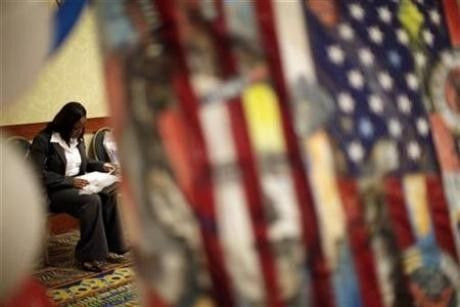Drug Testing for Unemployment Benefits Allowed in Payroll Tax Cut Bill

A House bill to extend a payroll tax cut would also authorize states to require drug testing for recipients of unemployment benefits, prompting questions about the measure's effectiveness and legality.
The language in the bill, which appears unlikely to become law in its current form given stiff opposition from Senate Democrats, ensures that federal law would not prohibit states from implementing drug testing. While that is less stringent than an unsuccessful proposal that would have mandated drug testing for some unemployment insurance applicants, it still drew criticism from Democrats, who said it would violate Fourth Amendment protections against search and seizure.
One of the most egregious aspects of this bill is that it promotes state drug testing for workers to qualify for unemployment benefits, Rep. Gwen Moore (D-Wis.) said on the House floor Tuesday. Mr. Speaker, did the authors of this provision know about the Constitution of the United States of America?
Proponents of the measure argue that it would help reduce strain on overburdened unemployment insurance programs by screening out drug users, while critics argue that it will needlessly add to the struggles of unemployed Americans.
What is really driving this is stereotyping and this assumption that if you can't get a job you must be doing something wrong: you're not looking hard enough, you don't have an education, you're a substance abuser, said Elizabeth Lower-Basch, senior policy analyst at the Center for Law and Social Policy. It's an assumption that when people are unemployed it must be because of their failings.
Lower-Basch noted that drug tests would affect people who use drugs occasionally for leisure in addition to the chronic users tests ostensibly seek to catch. 20 states explicitly deny unemployment benefits to people who lost their job because of drug use or a failed drug test, and Lower-Basch said most other states would likely apply the same criteria to bar drug users from drawing unemployment benefits.
State lawmakers who have already advocated drug testing have portrayed drug users drawing public benefits as a widespread problem and a drain on public resources. South Carolina governor Nikki Haley argued for instituting drug testing by noting that half of the unemployed workers looking for jobs at a nuclear facility had failed drug tests, a figure that she later admitted was false. A state senator in Tennessee argued that drug tests would discourage people from living off of government largesse, arguing that recipients had a mindset of sit around and wait for that perfect thing for 99 weeks, and let somebody else pay my bills for me.
We don't need to be subsidizing someone's drug habit. The employers are the ones who are having to pay for it, and there's limited dollars, State Senator Stacey Campfield said. We are trying to get it to those people who really do need it, who are actually trying to do something, to get themselves out of unemployment, not more or less sitting at home getting stoned.
But critics note that there is no credible evidence suggesting that drug use is more prevalent among the unemployed. In an analogous case, a voided Florida law that required drug testing for welfare applicants resulted in only two percent of applicants testing positive, far lower than the level anticipated by backers of the law.
Such a large section of employers are now doing pre-employment drug testing that employers, if they are concerned about substance abusers they have the tools to basically screen substance abusers out of their hiring pool, said George Wentworth, a senior staff attorney for the National Employment Law Project. [It's] a lot more direct way of dealing with the concern than submitting the millions of people who are applying for unemployment benefits to some kind of drug testing requirement when there's no data to suggest that group is more likely than other group to be at risk of being a drug user.
There are also legal issues. While there is no precedent for states linking drug tests to unemployment benefits, a Michigan law requiring drug tests for people who applied for Temporary Assistance for Needy Families was overturned for violating the Fourth Amendment. A judge invoked the same argument in blocking Florida's law mandating drug testing for welfare applicants.
A drug test is a fourth amendment protected search -- it's an invasion of the body that's within the scope of the Fourth Amendment, said Jordan Budd, a professor at New Hampshire Law School who has studied the legality of drug testing. Government's ability to conduct that kind of suspicionless search in the absence of any individualized evidenced of wrongdoing is pretty limited.
© Copyright IBTimes 2025. All rights reserved.




















